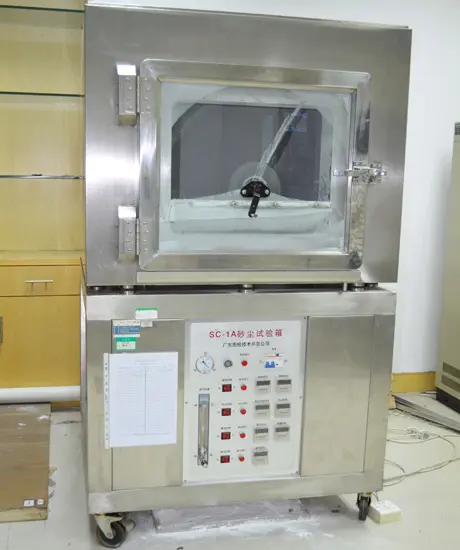
Reliability Testing Services Laboratory
Reliability Testing Methods: Vibration, shock, drop, IP testing, durability testing, electrical parameter testing, PCB failure analysis.
Testing Standards: IEC 60068-2, astm d4169-16, GB/T 2423, JIS D5500, MIL-STD-810G, IEC 60529-1989, GB 4208-2008, ISO 20653:201, EIA-364, IEC 60243-1:2013, IPC TM 650, J-STD-002B, MIL-STD-202G.
Applicable Products: Raw materials, components, parts, enclosures, complete systems, automotive electronic products, elevator products, etc.
Service Background
Reliability engineering and management is a rapidly developing interdisciplinary field that emerged in the 1940s, encompassing design mathematics, physics, chemistry, electronics, mechanics, environment, management, and human factors engineering. Reliability engineering and management is a complex systems engineering discipline focused on improving the reliability of raw materials, components, parts, complete systems, and other products throughout their entire lifecycle, including research, design, manufacturing, use, and maintenance.
Both domestic and international practices have demonstrated that the application of reliability engineering and management brings significant economic benefits to enterprises and society, garnering attention worldwide. Countries are investing substantial human and material resources in research and application promotion. Product reliability will undoubtedly become a focal point in future international market competition.
JJR Laboratory in China offers reliability testing services. We welcome you to request a quote.
1. Vibration Test
- Testing Principle: Primarily simulates the various environmental vibrations encountered during product manufacturing, assembly, transportation, and usage stages to determine whether the product can withstand these vibrations. The testing is categorized into random vibration and sinusoidal vibration.
- Testing Standards: IEC 60068-2-64:2008 (Random Vibration), IEC 60068-2-6:2007 (Sinusoidal Vibration), GB/T 2423.56-2006 (Random Vibration), GB/T 2423.10-2008 (Sinusoidal Vibration), ASTM D4169-16.
2. Shock Test
- Categories: Half-sine wave, trapezoidal wave, sawtooth wave.
- Testing Principle: Simulates the extreme shock forces that a sample may encounter during use and transportation. The shock wave’s instantaneous energy release is used to analyze the sample's ability to withstand external shocks.
- Testing Standards: IEC 60068-2-27-2008, GB/T 2423.5-1995, EIA 364-27C-2011.
3. Drop Test
- Testing Principle: Determines the product's adaptability to rough handling during transportation and assesses the minimum strength required to meet safety standards.
- Testing Standards: IEC 60068-2-31:2008 Free Fall, GB/T 2423.8-1995, MIL-STD-810Gw/Change 1: 2014.
4. Dust/Waterproof Testing (IP TEST)
- Testing Principle: Verifies the protection level of enclosures. Waterproof levels range from IPX1 to IPX9K; dustproof levels range from IP5X to IP6X; foreign object protection levels range from IP1X to IP4X.
- Testing Standards: IEC 60529-1989, AMD.2-2013, COR.2-2015, GB 4208-2008, GB/T 4942.1-2006.
5. Electrical Reliability Testing
- Testing Principle: Provides electrical performance testing of various products based on customer requirements. This includes testing the electrical properties of insulating materials and electronic products, such as surface resistance (resistivity), volume resistance (resistivity), dielectric strength, LCR testing, temperature rise, power consumption, and leakage current.
- Testing Standards: IEC 62631-3-2:2015 (Surface/Volume Resistivity), GB/T 1410-2006 (Surface/Volume Resistivity), ASTM D149-09(2013) (Dielectric Strength), IEC 60243-1:2013 (Dielectric Strength), EIA-364-21E:2014, PCB Failure Analysis.
6. X-RAY Non-Destructive Testing
- Testing Principle: Used for defect detection within PCBA or products, including weld quality, open circuits, bridging, etc.
- Testing Standards: IPC 600, IPC 610, IPC TM650, IPC 6102/6013.
7. C-SAM Ultrasonic Scanning
- Testing Principle: Detects delamination within the packaging.
- Testing Standards: J-STD-035.
8. SEM/EDS Scanning Electron Microscopy
- Testing Principle: Observes surface morphology and analyzes components at high magnification.
- Testing Standards: IPC 600, IPC 610, IPC TM650, IPC 6102/6013.
9. Microsectioning (Cross-section)
- Testing Principle: Observes internal defects through sectioning.
10. Dye & Pry
- Testing Principle: Observes internal defects of BGA solder joints, such as cracks.
11. Decapsulation (De-cap Test)
- Testing Principle: Uses chemical solvents to decapsulate ICs to observe internal short circuits or burnout conditions.
Email:hello@jjrlab.com
Write your message here and send it to us
 Laser Product Qualification Consultants
Laser Product Qualification Consultants
 UL 268 Smoke Detector
UL 268 Smoke Detector
 How to Get Approved to Sell Toys on Amazon
How to Get Approved to Sell Toys on Amazon
 Element EMC Testing
Element EMC Testing
 Authorized Representative EU
Authorized Representative EU
 EU Representative Service
EU Representative Service
 ASTM F2413 Shoes Certification Testing
ASTM F2413 Shoes Certification Testing
 UL Listed Smoke and CO Detectors
UL Listed Smoke and CO Detectors
Leave us a message
24-hour online customer service at any time to respond, so that you worry!




